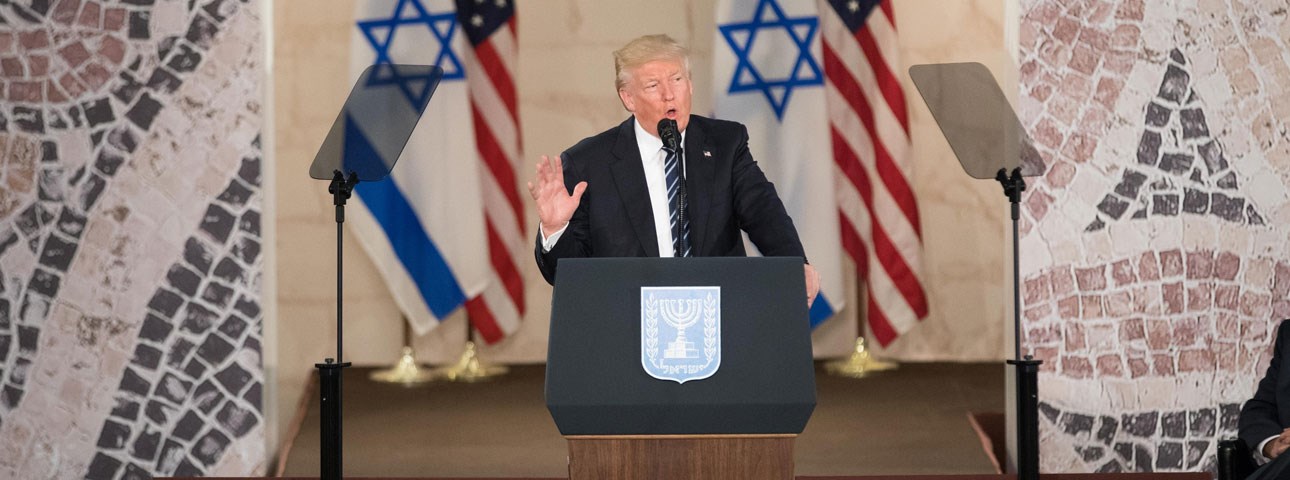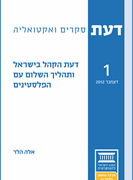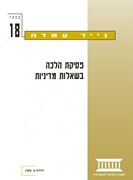

Publications Regarding Peace Process
Articles

The Two Coalitions Israel Needs Now
Written By: Yohanan Plesner
It is increasingly clear that Israel’s future depends on the forging of two coalitions. One is a multinational alliance determined to turn the Palestinian issue from a driver of conflict into an engine of peace. The other, is an internal Israeli coalition ready to pursue a series of bold social, economic, and political reforms.

Peace Deals
Written By: Dr. Shany Mor
Bahrain and United Arab Emirates peace deals show Washington’s Arab-Israel ‘experts’ got it all wrong again

Netanyahu Just Made his Greatest Contribution to a Jewish and Democratic Israel
Written By: Dr. Shany Mor
Even if the agreement with the UAE leads nowhere, the taboos that have been broken will be difficult to reconstruct.

Annexation and the Violation of Human Rights
Written By: Prof. Amichai Cohen, Prof. Yuval Shany
What are the possible human rights implications of annexing parts of the West Bank? In these experts from a more detailed analysis in Hebrew, IDI detail the rights that might be violated if the plan moves forward.

Heading Towards Annexation? IDI's Experts Hold Online Briefing for International Diplomats
Written By: Yohanan Plesner , Prof. Yuval Shany
IDI President Yohanan Plesner and VP of Research Prof. Yuval Shany held an online briefing for the diplomatic community in Israel focusing on potential plans by the government to apply sovereignty in parts of the West Bank.

IDI's Experts Hold Online Briefing Ahead of Annexation
Written By: Yohanan Plesner , Prof. Amichai Cohen
IDI experts held today an online briefing focusing on potential plans by Israel's government to apply sovereignty in areas of the West Bank as part of the U.S’ ‘Deal of the Century’

Over Half of Jewish Israelis Support Annexation
Written By: Prof. Tamar Hermann, Dr. Or Anabi
The Israeli Voice Index for April 2020, found that 52% of Jewish Israelis support Prime Minister Benjamin Netanyahu's stated policy of extending Israeli sovereignty in the West Bank, however only 32% believes Israel will move forward with this in the coming year.

Can Israel Recognize a Palestinian State?
The January Israeli Voice Index reveals that more Israelis support Israeli recognition of a Palestinian state than those who oppose it.

Israelis Believe Netanyahu's Investigations Will have the Greatest Impact on the Vote
Written By: Prof. Tamar Hermann, Dr. Or Anabi
January's Israeli Voice Index found 32% of Israelis believe Netanyahu's investigations will be the issue with the greatest impact on voters in the upcoming Knesset elections.

Can the “Deal of the Century” be Implemented Under a Transitional Government?
Written By: Prof. Amichai Cohen, Dr. Amir Fuchs
What are the legal barriers standing in the way of the current government implementing the U.S.'s “Deal of the Century” peace plan?

Towards the Elections: Prime Minister Netanyahu gets Mixed Grades
Written By: Prof. Tamar Hermann, Dr. Or Anabi
Prime Minister Benjamin Netanyahu is awarded high grades for improving Israel’s international standing (60%), enhancing the country's military strength (56%), and successfully contending with the Iranian threat (50.5%) but poor grades for failing to increase solidarity between Israel's different segments of society (51%) and on the question of personal integrity (49%).

Exclusive Pre-Elections Survey
Written By: Prof. Tamar Hermann, Dr. Or Anabi
Exclusive Pre-Elections survey by the Guttman Center at the Israel Democracy Institute finds that half of Israelis find it harder than in the past to decide whom to vote for; 25% base their choice on the party’s positions on socioeconomic issues and 18% on who heads the party; 27% do not trust the integrity of the Knesset elections

Is the Two-State Solution Still Relevant?
Written By: Prof. Tamar Hermann, Prof. Ephraim Yaar
Half of the Jewish Israeli public think that Palestinians deserve an independent state, but believe that the two-state solution would be impossible to implement.

Israelis Think Clinton Will Put Pressure on Them, Support Her Nonetheless
Latest Peace Index: A clear majority of Jewish Israelis believes Democratic presidential candidate will take election on Nov. 8

Israelis Believe Clinton will Push them Harder on Peace, Back Her Anyway — Poll
Written By: Marissa Newman
Israelis may have given up for now on peace, but still want peace talks. Arab Israelis are more optimistic than their Jewish counterparts about state’s future.

Surprised? Meet Israel’s New political Center
Written By: Prof. Yedidia Z. Stern
Although one need not agree with the positions held by Israel’s Arab citizens, it can’t be denied that they constitute an independent, moderate voice – and a promising political middle ground on the Palestine- Israeli conflict. This article first appeared in The Jerusalem Post.

Peace Index: 62% of Israelis Predict Clinton Will Win U.S. Election
Sixty-two percent of Israelis expect Democratic candidate Hillary Clinton to win the U.S. election, according to the latest Peace Index, published Wednesday by the Israel Democracy Institute and Tel Aviv University.

Monthly Peace Index: IDF should Espouse Pluralistic and Open Value System
Sixty-nine percent of Jewish Israelis believe it is good for the IDF to espouse a pluralist and open value system, including accepting “others,” such as members of the LGBT community.

55% of the Jewish Public Prefers Continued Israeli Rule Over the Palestinians
IDI's Guttman Center for Surveys examines Israelis' attitudes towards the continued presence in the territories as we move into the 50th year following the Six Day War. Participants discuss the security situation, their factual knowledge of the situation in the West Bank, and their predictions for the future of the territories.

Israelis: Palestinians Must Recognize Israel as State of Jewish People
Public sees Israeli government's performance to be medium or low

66% of Jewish Public: 'It Is a Commandment to Kill a Terrorist Who Comes At You with a Knife'
Latest Peace Index shows Jewish Israelis agree Europe lacks the ability to combat terror, but favor collaborating with Turkey to fight terrorism. Plus, Israeli Jews now see Democratic frontrunner Clinton as better for Israel than Republican Trump.

Hovering on Shifting Ground
Written By: Prof. Tamar Hermann
The Peace Index has shown us that when it comes to the political situation, the majority of the Israeli Jewish population is in a conceptual fog. On the one hand, the Israeli center and center-left has become growingly frustrated and disillusioned with the option of peace as it was perceived in the early ‘90s. On the other hand, the center and center-right have come to acknowledge that there must be a solution and that this solution could mean some type of splitting of the land, most probably a two-state solution. This article was first published by the Jerusalem Post.

49% of Israelis Willing to Put Up Wall, Separate from Palestinians
The majority of Israeli Jews (52.8%) say Israel applies the law equally toward Jews and Palestinians living in the West Bank, contrary to a statement made last month by U.S. Ambassador Dan Shapiro. However, 50.1% of respondents thought Israel would be justified in unequal application of the law toward Jews and Palestinians in the territories.

Are we experiencing a third Intifada?
Other finding: image of present Knesset members is, in the vernacular, "lousy"

Confronting the Rabin Assassination
Written By: Prof. Mordechai Kremnitzer
Nineteen years after the murder of Prime Minister Yitzhak Rabin, IDI Vice President Prof. Mordechai Kremnitzer explores the background, meaning, and ramifications of this event, taking a hard look at some of the dangers he sees in Israeli society today.

On Operation Protective Edge, Justice, Law, and Victory
Written By: Admiral (Res.) Amichay (Ami) Ayalon
Admiral Ami Ayalon asserts that the winner of today's wars is the side whose story is perceived as just, and argues that without a diplomatic track, Israel cannot win the war, even if the war is justified and Israel adheres to international law in the face of terrorists who violate it.

July 2014 Peace Index

May 2014 Peace Index
This month's Peace Index poll covers US-Israel relations, theoretical unilateral moves by the Israeli government, attitudes towards and pursuit of "price tag" perpetrators, and Israeli defense and socioeconomic challenges.

April 2014 Peace Index
Two-Thirds of Israeli Jews Agree with Israeli Gov’t Decision to Halt Negotiations Following Hamas Reconciliation
Majority of Israeli Jews Disagree with US President Obama Blaming Both Sides for Lack of Progress in Talks

The Referendum Law: A Wolf in Sheep’s Clothing
Written By: Prof. Yedidia Z. Stern
Is it advisable to hold a referendum on a peace deal involving territorial concessions? In an article originally published in the Israeli Bar Journal, IDI Vice President Prof. Yedidia Stern expresses his reservations—and proposes an alternative.

"Black Feet" in Judea and Samaria: The Algerian Evacuation Model and its Relevance for Israel
Written By: Yair Sheleg
While pending the possible decision to evacuate settlements in Judea and Samaria, IDI Research Fellow Yair Sheleg offers a new model of evacuation, based on the Algerian evacuation model, altered to fit Israeli reality.




